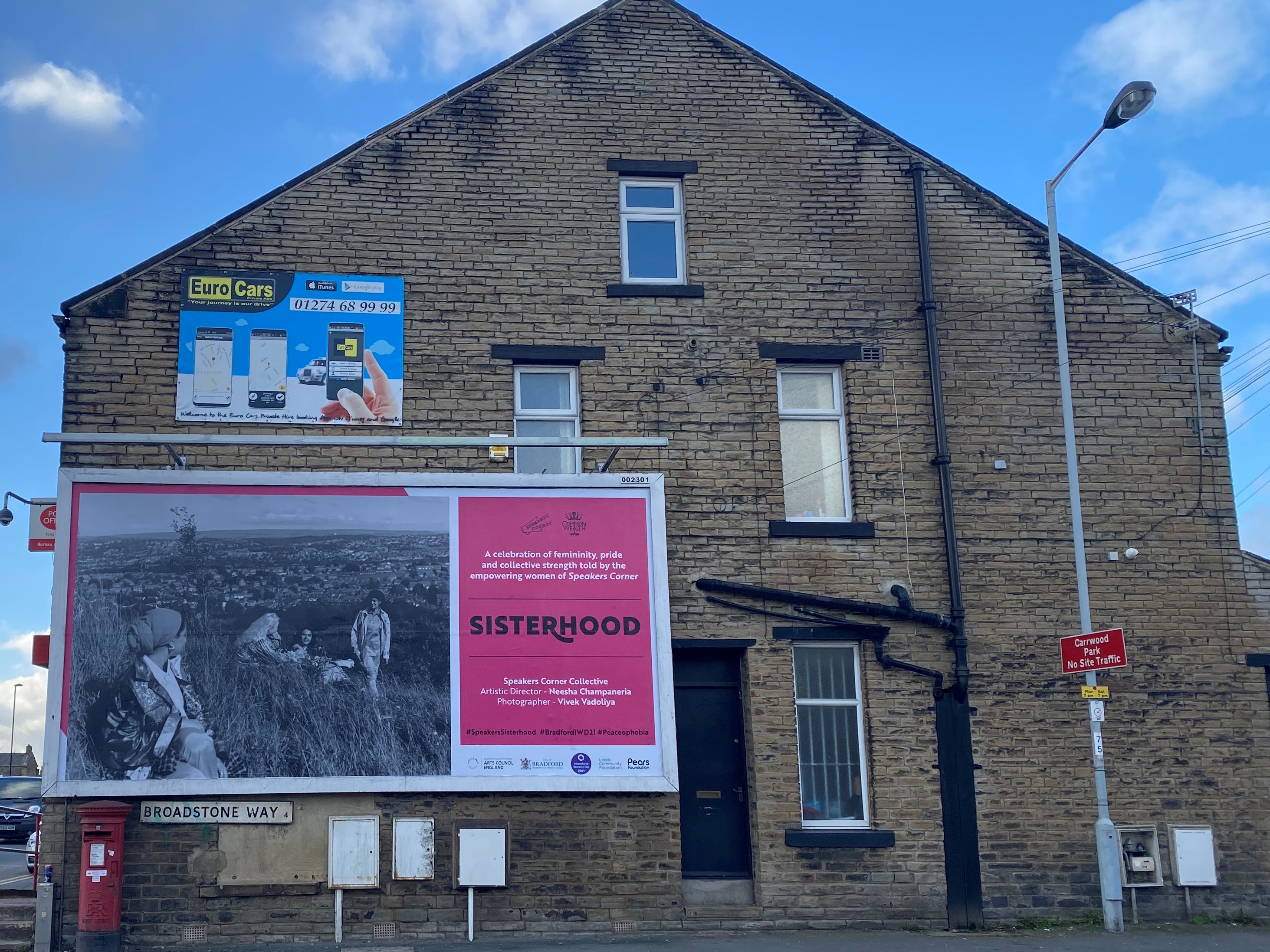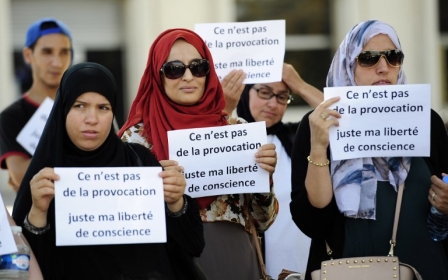Hope, resistance, unity: A Bradford collective embody the spirit of International Women's Day

Young women in Bradford are taking back control of their own narratives. In celebration of International Women’s Day, they have organised a public photography exhibition across city billboards, reclaiming public space by portraying their empowering sisterhood.
Amid heightened isolation during the Covid-19 pandemic, the group from Speakers' Corner Collective, a creative and political space that mobilises girls and young women in Bradford, came together last summer for a photoshoot.
Sisterhood is a series of images created in collaboration with art director Neesha Champaneria and photographer Vivek Vadoliya, who said they wanted to “go beyond the cliches of what you might expect it means to be a South Asian female in Bradford, thinking about Bradford’s rich migration history and its connection to the textile industry that built the city’s current architectural and cultural landscape”.
'This photoshoot highlighted everything that us Bradford girls encompass - power, unity and not letting anyone put us in a box'
- Zakia Jabeen, Speakers' Corner Collective
This creative project, featuring powerful photographs of young women, is part of a campaign that couldn’t be more timely. Bradford has been at the centre of heightened political tensions for years, and it has been heavily impacted by the current financial crisis, intensified by the Covid-19 pandemic.
Its diverse population, which includes a significant Muslim component, is too often demonised and used as a convenient scapegoat by politicians who fail to address the mass unemployment and poverty plaguing the area. The collective aims to disrupt the cycle of oppression that many young Muslim women are up against, being “sometimes hyper-visible and sometimes invisible”.
Stay informed with MEE's newsletters
Sign up to get the latest alerts, insights and analysis, starting with Turkey Unpacked
While rising Islamophobia, which has impacted women disproportionately over the last two decades, dangerously paints Muslim women as passive, permissive and “controlled” by the men within their communities, Speakers' Corner Collective radically resists such oppressive mischaracterisations.
"This photoshoot highlighted everything that us Bradford girls encompass - power, unity and not letting anyone put us in a box,” said member Zakia Jabeen. “It felt so powerful being dressed in bright colours, leading, revolutionising and unapologetically being ourselves. We are free-spirited, passionate Bradfordian women.’’
No, these young women are not submissive subjects of headlines and political agendas, they are actively part of the city in which they live and are asserting this through their photographs- a creative visual large-scale presence. Sisterhood is also a powerful act of countering the erasure of Muslim women’s agency, expression and resilience.
This exhibition is a reminder of not only their rooted and unapologetic existence, but also their role in shaping that society.
The exhibition is part of the collective’s wider Peaceophobia project, in collaboration with the award-winning theatre company Common Wealth. The project, billed as “part car-show, part theatre”, represents a community response to rising Islamophobia around the world.
Transforming society
The global and the local are one and the same for these young women, who recently marked the 30th anniversary of the mass rape and violence in Kunan Poshpora, Kashmir. In their campaign titled Justice in Kashmir is Justice Here, the collective worked with artist Haniyya Ejaz to produce a comic strip recounting the mass rape and the continued lack of justice for its victims. It is displayed across Bradford and featured in a short film that includes a poem by 15-year-old Noor Jahangir.
It is incredible to think that all this has been achieved over the course of mass lockdowns, loss and hardship, especially considering how hard hit the arts have been. What the collective has created is a testament to their power and will.
The resistance of these young women is multifold: their artistic expressions are powerful reflections of their immediate surroundings, and a confident critique of the world they inhabit. Through each initiative, the collective challenges lazy stereotypes and dangerous narratives about their community and Muslim women’s ability to transform society.
While I am in awe of their efforts, I am not surprised by these achievements. I have witnessed first hand the energy, political awareness and solidarity that this space nurtures and encourages.
In the summer of 2019, I pulled out of the Bradford Literature Festival, along with other scheduled speakers, after we discovered that the festival had accepted funding from the Home Office’s “Building a Stronger Britain Together” fund, part of its counter-extremism programme. Within days, despite significant hostility from the organisers and local institutions, Speakers' Corner invited those of us who withdrew to host an alternative event on the destructive impacts of the counter-extremism strategy on Muslim communities.
Without hesitation, the collective not only provided the physical space, but helped put the whole event together and spread the word across Bradford. Their unapologetic, fearless defence of the oppressed empowered many who feared backlash from powerful local voices to participate in the alternative event and speak out.
Reflection of the times
Artist Nina Simone once stated that an artist’s duty “is to reflect the times”. The Sisterhood exhibition reflects a current reality filled with rich revolutionary hope, resistance, unity and beauty in the face of considerable political challenges and repression.
The women who have organised this powerful artistic disruption - in the face of an otherwise toxic narrative about them, which often circulates through mainstream media - are showing us all what International Women’s Day is really about. They refuse to be silenced or pushed into the shadows.
You will see them on a large scale, confidently owning their public spaces and redefining them through creation and struggle.
The views expressed in this article belong to the author and do not necessarily reflect the editorial policy of Middle East Eye.
Middle East Eye delivers independent and unrivalled coverage and analysis of the Middle East, North Africa and beyond. To learn more about republishing this content and the associated fees, please fill out this form. More about MEE can be found here.







